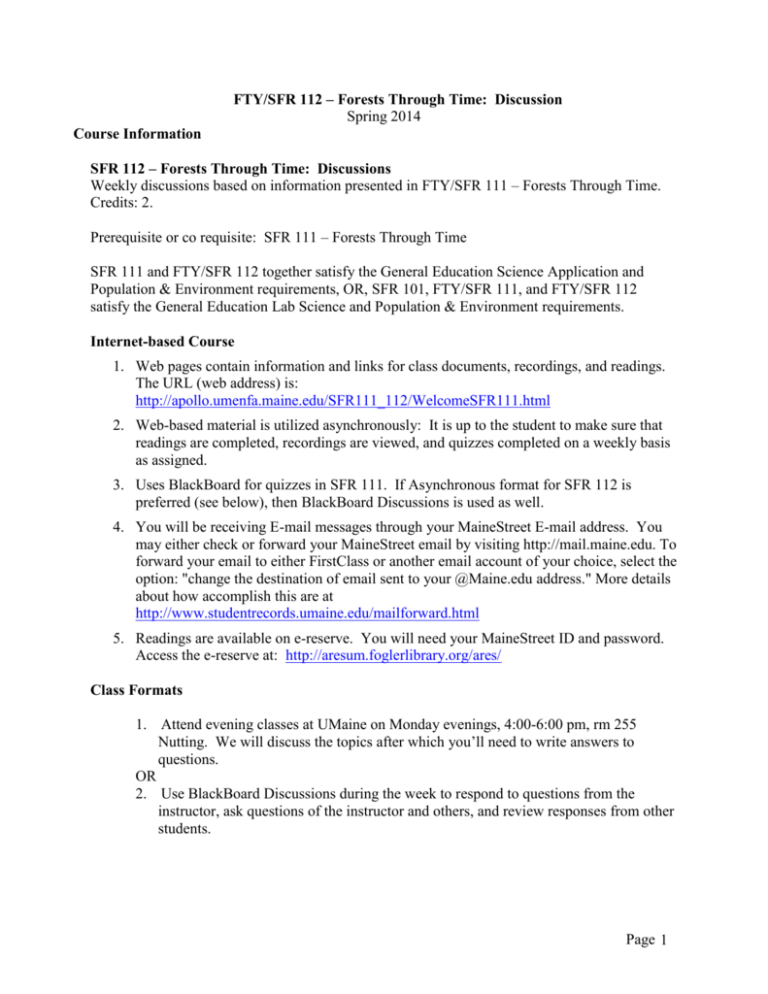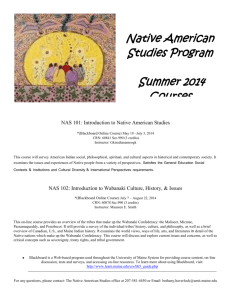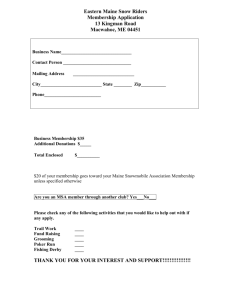FTY/SFR 112 – Forests Through Time: Discussion
advertisement

FTY/SFR 112 – Forests Through Time: Discussion Spring 2014 Course Information SFR 112 – Forests Through Time: Discussions Weekly discussions based on information presented in FTY/SFR 111 – Forests Through Time. Credits: 2. Prerequisite or co requisite: SFR 111 – Forests Through Time SFR 111 and FTY/SFR 112 together satisfy the General Education Science Application and Population & Environment requirements, OR, SFR 101, FTY/SFR 111, and FTY/SFR 112 satisfy the General Education Lab Science and Population & Environment requirements. Internet-based Course 1. Web pages contain information and links for class documents, recordings, and readings. The URL (web address) is: http://apollo.umenfa.maine.edu/SFR111_112/WelcomeSFR111.html 2. Web-based material is utilized asynchronously: It is up to the student to make sure that readings are completed, recordings are viewed, and quizzes completed on a weekly basis as assigned. 3. Uses BlackBoard for quizzes in SFR 111. If Asynchronous format for SFR 112 is preferred (see below), then BlackBoard Discussions is used as well. 4. You will be receiving E-mail messages through your MaineStreet E-mail address. You may either check or forward your MaineStreet email by visiting http://mail.maine.edu. To forward your email to either FirstClass or another email account of your choice, select the option: "change the destination of email sent to your @Maine.edu address." More details about how accomplish this are at http://www.studentrecords.umaine.edu/mailforward.html 5. Readings are available on e-reserve. You will need your MaineStreet ID and password. Access the e-reserve at: http://aresum.foglerlibrary.org/ares/ Class Formats 1. Attend evening classes at UMaine on Monday evenings, 4:00-6:00 pm, rm 255 Nutting. We will discuss the topics after which you’ll need to write answers to questions. OR 2. Use BlackBoard Discussions during the week to respond to questions from the instructor, ask questions of the instructor and others, and review responses from other students. Page 1 Technical Requirements 1. Use of a computer is required. Students must be proficient in using internet browsers and downloading files. The computer must also be capable of playing videos with sound. 2. Documents are in MS Word format. If you do not have MSWord, you need a copy of Word Viewer : http://www.microsoft.com/en-us/download/details.aspx?id=4 3. Documents are also in PDF format. To view them, you need a copy of Adobe Reader on your computer. You can download a copy of the program at: http://www.adobe.com/products/acrobat/readstep2.html 4. Recordings require a high speed internet connection for viewing. A high speed internet connection can be a DSL connection, a cable connection, or a T-line connection such as that found on the UMaine campus. Warning: Without a high speed internet connection, you will not be able to view the recordings; please make sure you have access to high speed internet before registering for the course. 5. Flash Player is required for viewing recordings. Download the Player at: http://get.adobe.com/flashplayer/ 6. Registered students need to use BlackBoard. Information about BlackBoard and getting an account is available at: http://support.courses.maine.edu/ 7. For additional questions or comments, e-mail cedtechhelp@umit.maine.edu Learning Outcomes Students will be able to use scientific concepts and principles to: 1) Explain basic components of the forest. 2) Compare and contrast the causes of forest change over time due to: a) Climate b) Human use 3) Analyze the composition and history of a forest and articulate future changes in the forest if: a) No disturbance occurs b) A disturbance occurs such as logging and wind storms c) Climate change occurs 4) Ascertain how these changes affect wildlife populations and humans Page 2 Faculty Information Questions or requests for appointments can be submitted to an instructor by using email. William H. Livingston Associate Professor, School of Forest Resources University of Maine 5755 Nutting Hall rm 201b Orono, ME 04469-5755 ph: 207-581-2990 fax: 207-581-4257 e-mail: WilliamL@maine.edu Required Readings and Books 1. Required: Citation Kricher, J.C. 1998. A Field Guide to Eastern Forests, North America. Houghton Mifflin Co., NY. 488 p. Referred to in course as: Eastern Forests Maine Forest Service. 2008. Forest Trees of Maine. 2. Other References Used Throughout the Course (available on-line): Citation Referred to in course as: Howard, Jonathan. 2001. Darwin – A Very Short Introduction. Oxford University Press, NY. 125 p. Darwin Bryan, R.R. 2004. Focus Species Forestry – A Guide to Integrating Timber and Biodiversity Management in Maine, 2nd ed. Maine Audubon, Falmouth, Maine. 92 p. ? Focus Species Forestry Harpstead, M.I., T.J. Sauer, and William F. Bennett. 1997. Soil Science Simplified. Iowa State University Press. 210 p. Soil Science McWilliams, W.H., and others. 2005. The Forests of Maine: 2003. USDA, Forest Service, Northeastern Research Station Resource Bulletin NE-164. 188 p. Forests of Maine Russell M. Burns and Barbara H. Honkala, Technical Coordinators. 1990. Silvics of North America: 1. Conifers; 2. Hardwoods. Agriculture Handbook 654. U.S. Department of Agriculture, Forest Service, Washington, DC. (2 vol.) 877 p. (also available at: http://www.na.fs.fed.us/pubs/silvics_manual/table_of_contents.shtm) Silvics of North America 3. Additional references needed for specific topics will be indicated in the topics web page and lecture outline. Readings will be available on-line. Grading and Course Expectations Students are required to participate in the once-a-week class sessions. Material from SFR 111 will be assigned each week, and the quiz for the assigned material must be completed prior to the start of the sessions. Failure to complete the quiz will result in zero credit for the discussion session. Page 3 Grades for the discussion session will be based on: 1. Written assignments (40%) Assignments are based on weekly topics presented on the Forests Through Time Online web site and will relate the material to the Learning Outcomes for the class. A 2-3 page response to specific questions on each topic is expected. Written responses are due at midnight on Tuesday after the class in which they were discussed. 2. Class questions (40%): You will need to answer questions during the Monday evening class, and these will be graded. If you don’t attend class sessions, then you need to participate in the BlackBoard Discussions which will be graded. BlackBoard Discussions: You'll need to respond to questions and postings on the BlackBoard Discussions tool if you do not attend the weekly class sessions. More information is provided later in the syllabus on using the Discussion tool. Your written responses, at least 200 words, that are posted to BlackBoard will be graded. You'll have until Tuesday midnight to complete your messages for the discussion. It is expected that you'll need at least an hour during the week to complete the postings IN ADDITION to the time needed to view the lecture recordings, take the quiz for SFR 111, and write the next written assignment for SFR 112. 3. Final Exam (20%) a. A final exam will be given on BlackBoard and will be based on the questions given on the quizzes for SFR 111. b. The Exam will be worth 200 points (40 questions). Final grades will be assigned as follows: A= >90% of possible points, B= 80-89%, C= 70-79%, D= 60-69% F = <60% Policies 1. Academic honesty (plagiarism, etc.): Academic dishonesty includes cheating, plagiarism and all forms of misrepresentation in academic work, and is unacceptable at The University of Maine. As stated in the University of Maine’s online undergraduate “Student Handbook,” plagiarism (the submission of another’s work without appropriate attribution) and cheating are violations of The University of Maine Student Conduct Code. An instructor who has probable cause or reason to believe a student has cheated may act upon such evidence, and should report the case to the supervising faculty member or the Department Chair for appropriate action. 2. Students with disabilities statement: If you have a disability for which you may be requesting an accommodation, please contact Ann Smith, Director of Disabilities Services, 121 East Annex, 581-2319, as early as possible in the term. How to Use BlackBoard Discussion If you DO NOT attend a Monday evening class, then you MUST participate in the BlackBoard discussions. This is the first year of using BlackBoard for SFR 112, so please report any problems in your use of the service. Page 4 1. Log into BlackBoard and select “SFR 112-0990 :Forests through Time-Discuss. 2. Go to the left menu bar, and scroll down to “My Groups”. Under “My Groups”, click on “Group Discussion Board”. 3. On the “Discussion Board” page, click on the first link (the link’s text will be the first question for the week) below the word “Forum” 4. On the “Forum” page, you will find the discussion question as the first statement under “Thread”; click on this link. 5. On the “Thread Detail” page, you’ll see the thread’s question. a. If you are the first to respond to the question, there will be no other messages listed. i. Click on the “Quote” button. ii. Type in your response. You receive one point for each valid item of information in your response. Plan on your responses being 200 words. If it’s less than that, then you won’t receive full credit. iii. Click “Submit” b. If others have already submitted responses, you will see them listed under the question’s text. i. Click on “All” next to the word “Select”. ii. Click on “Collect”. This will display the question and all of the responses. iii. You can respond to any of the messages that appear – click on the “Quote” button located beneath the text of the response to which you want to respond. iv. BE SURE TO ADD NEW INFORMATION TO THE DISCUSSION. YOU WILL NOT RECEIVE POINTS FOR ITEMS ALREADY MEANTIONED. New information can include material from outside sources. You can also introduce questions about the topic that you have followed by what you think is the correct answer. v. Type in your response and click “Submit”. 6. To get back to the discussion questions, go back to the left menu and click on “Group Discussion Board” underneath the “My Groups” title 7. Respond to all questions that are listed. I expect answers to be thorough, well justified, and about 200 words long for 15 points. Simply stating “yes” or “no”, or writing one sentence is not enough. Try and use as much information from the readings and recordings as is relevant. Grades will be posted on BlackBoard. A link to the recording of a Monday evening class will be available on the Assignments page on the SFR 111/112 web site (not BlackBoard). You are welcomed to view the recording to help with developing answers for the discussion questions. Page 5 New discussion topics will be posted by Wednesday evenings. Your responses must be entered by the following week on Tuesday at midnight. You can return and add to the discussion prior to the due date on Tuesday evenings. Multiple responses should give you a higher grade. After the discussion has closed, you can only make-up the work by going to the “Discussion Makeup” folder on BlackBoard and follow the instructions. You are welcomed to email me a question that arises as you write your responses to the discussions. Page 6 Course Schedule Assignment # Due Date Topic # Title Basic Principles 1 Jan 21 1. Introduction to the Forests of Maine 1 Jan 21 2. Scientific Principles Important to Forests 2 Jan 28 3. Principles of Biology Needed to Understand Forest Diversity 3 Feb 4 4. Tree & Plant Biology 4 Feb 11 5. Principles of Geology, Soils, and Landforms Needed to Understand Forests 5 Feb 18 6. Principles of Forest Ecology Needed to Understand Forest Dynamics 6 Feb 25 7. Principles of Wildlife Ecology (note: due date on Thursday due to fall break) 7 Mar 18 8. 10,000 Years of Forest Change 8 Mar 25 9. Land Ethic Spruce-Fir Forest 9 10. Spruce-Fir Forest: Tree Adaptations and Ecology 9 Apr 1 Apr 1 11. Spruce-Fir Forest: Wildlife Habitat Associations 9 Apr 1 12. The Spruce-Fir Forest Prior to 1900 10 Apr 8 13. The Spruce-Fir Forest 1900 to 1976: Pulp Era 10 Apr 8 14. The Spruce-For Forest 1976-Present 11 Apr 15 15. Future Opportunities in Forest Products 11 Apr 15 16. Forest Certification and The Future of the Forest Forests in Our Lives 12 Apr 22 Apr 29 17. Forests and Children Makeup Note: All written assignments and discussion assignments are due by midnight on Tuesdays after the Discussion Date. Email reminders will be sent In the event of disruption of normal classroom activities, the format for this course may be modified to enable completion of the course. In that event, you will be provided an addendum to this syllabus that will supersede this version. Page 7


